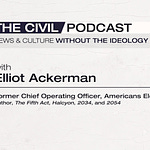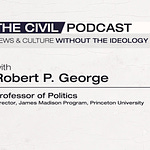This week on Steelman/Strawman, we were fortunate to speak with Representative Jason Crow. Jason represents the 6th District in Colorado and serves as the Co-Chair of the For Country Caucus, a bipartisan group of military veterans who work alongside With Honor to advocate “for a less polarized congress that works for – and is trusted by – Americans.”
Jason comes from deeply blue-collar roots. His Irish-Catholic family was often financially insecure, and he lived in ten different houses growing up. He enlisted in the National Guard initially to help pay for college, but after 9/11 he joined the Army and served in the 82nd Airborne and the 75th Ranger Regiment. As a freshman congressman, he was one of the impeachment managers for Donald Trump’s first impeachment. At the beginning of his second term, he was one of the “Gallery Group;” a group of Representatives who were trapped on the floor of the House during the mob attack on January 6th.
Jason told two powerful stories from that day, both of which I would have explored further were I a better interviewer and not a glorious amateur, as my old teammates would put it. In the first, Jason recalls telling his colleagues to remove their pins (that identify them as members of congress) in hopes they may blend in with the crowd if the mob broke through. Later, after it was all over, one of Jason’s colleagues, Lisa Blunt Rochester, a black woman, said to him that she appreciated what he was trying to do, but had the mob broken through, “there is no blending in for me. The pin or not, it wouldn’t make a difference.”
Now, whatever one may think of the excesses in the current cultural battles over identity and DEI, a member of congress facing a moment when her skin color and gender will be all that matters if a mob breaks through a door is a jarring, powerful example of the reality on the ground in some times and places in our country.
Which leads to the second story. Jason tells of a moment when he looked around at the few Capitol police in the gallery; on whom everyone’s lives may rely. Again, consider the context. You may believe that the mob would not have actually hurt anyone in the chamber. But if you’ve ever been near a riot, you know how unpredictable and dangerous they are. And on that day, people had already been savagely beaten. Others would die. So, in the chamber at that moment, any reasonable person who had any previous experience with violence such as this, would have to assume that all their lives were in danger.
What Jason also knew from his time in the Army was this: no one knows if they will use deadly force until the moment comes. Looking around at the Capitol Police in the gallery, he had to assume that none of them had ever been in a firefight before. And certainly, no one there had ever been put in the position of possibly using deadly force in the halls of Congress. And though Jason expressed much admiration and respect for all the Capitol Police did that day, he had to wonder if he’d need to take a gun if the crowd broke through. In the interview I didn’t follow this as I wish I had, but that moment is worth dwelling on: a member of congress, an Army veteran, wondering if he’d need to take a gun and use deadly force against his fellow Americans, fellow veterans.

















US Congressman Jason Crow on Steelman/Strawman